|
|
|
Sort Order |
|
|
|
Items / Page
|
|
|
|
|
|
|
| Srl | Item |
| 1 |
ID:
133977
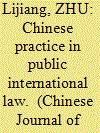

|
|
|
|
|
| Publication |
2014.
|
| Summary/Abstract |
This Survey covers materials reflecting Chinese practice in 2013 relating to: Fundamental Principles of International Law (The Principle of Equality of State Sovereignty; Permanent Sovereignty over Natural Resources; Prohibition of Threat or Use of Force; Peaceful Settlement of International Disputes; Non-intervention in Internal Affairs); Sources of International Law (Identification of Customary International Law; Guide to Practice on Reservations to Treaties; Provisional Application of Treaties); Relationship between International Law and Chinese Law (Act on Administration of Tax Collection Revised; Act on the Prevention and Control of Environmental Pollution by Solid Wastes Revised; Act on Seed Revised; Act on Animal Epidemic Prevention Revised; Act on Trade Mark Revised; Act on Fishery Revised; Act on Marine Environment Protection Revised; Act on Customs Revised); Recognition of New States (Palestine; Kosovo); Jurisdiction and Immunity (Scope and Application of Universal Jurisdiction; Immunity of State Officials from Foreign Criminal Jurisdiction); China's Territorial Integrity (Taiwan; Tibet; China-India Border; Diaoyu Island and its Affiliated Islands; Nansha Islands); Polar Regions (Arctic Council; Antarctic Treaty); International Law of the Sea (Submission to the Commission on the Limits of the Continental Shelf in part of the East China Sea; Commission on the Limits of the Continental Shelf (CLCS); International Seabed Authority (ISA); International Tribunal for the Law of the Sea (ITLOS); Marine Biodiversity beyond Areas of National Jurisdiction; Reorganization of State Ocean Administration); International Air and Space Law (Establishment of Air Defense Identification Zone in East China Sea; Peaceful Use of Outer Space; Transparency and Confidence-Building Measures in Outer Space; International Code of Conduct for Outer Space Activities); International Cyberspace Law (International Code of Conduct for Information Security; Cyber Crime); Aliens (Regulation on Administration of Exit and Entry); International Human Rights Law (Universal Periodic Review; Office of the High Commissioner for Human Rights (OHCHR); International Covenant on Civil and Political Rights (ICCPR); Convention against Torture and Other Cruel Inhuman or Degrading Treatment or Punishment (CAT); Convention on the Rights of the Child (CRC); Human Rights Treaty Bodies and Their Reform; Rights of Indigenous Peoples; Action Plan for Fighting Human Trafficking (2013-2020)); International Humanitarian Law (Protection of Civilians in Armed Conflicts; Protection of Journalists in Armed Conflicts); International Law on Disasters (Protection of Persons in the Event of Disasters); International Law on Arms Control, Disarmament and Non-proliferation (Nuclear Disarmament and Non-Proliferation; Chemical Weapons Convention; Biological Weapons Convention (BWC); Convention on Certain Conventional Weapons (CCW); Amended Protocol II to the CCW; Ottawa Convention; Convention on Cluster Munitions (CCM); Protocol V to the CCW (ERW); Improvised Explosive Devices (IEDs); Lethal Autonomous Robots; Arms Trade Treaty (ATT); Small Arms and Light Weapons; Conference on Disarmament (CD)); International Criminal Law (Crimes against Humanity; International Criminal Court (ICC); ICTY and ICTR; UN Comprehensive Convention against Terrorism; Agreement on the Procedure for Organizing and Conducting Joint Anti-Terrorist Exercises by Member States of the Shanghai Cooperation Organization; Agreement on the Procedure for Organizing and Conducting Joint Anti-Terrorist Operations within Member States of the Shanghai Cooperation Organization; Trafficking in Cultural Property; Ratification of the Treaty on Transfer of the Convicted between the People's Republic of China and the Republic of Kyrgyzstan; International Criminal Judicial Assistance and Police Cooperation); International Environmental Law (Climate Change; Sustainable Development; Protection of Atmosphere; Action Plan on Air Pollutio
|
|
|
|
|
|
|
|
|
|
|
|
|
|
|
|
| 2 |
ID:
133970
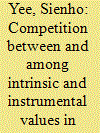

|
|
|
|
|
| Publication |
2014.
|
| Summary/Abstract |
Recently there has been a great deal of talk about visions and alternative visions of the world and the values involved in each vision.1 Obviously it is important for us to see clearly the various visions of the world. But the picture is quite murky and there is really no end to history, and there will be no conquering of one vision over another anytime soon. In the meantime, it is more important for us to be good decision-makers in any vision of the world that we find ourselves in, or choose to live in. To illustrate, if we are capitalists, we'd better be good capitalist decision-makers; if we are socialists, we'd better be good socialist decision-makers.
|
|
|
|
|
|
|
|
|
|
|
|
|
|
|
|
| 3 |
ID:
133975
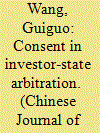

|
|
|
|
|
| Publication |
2014.
|
| Summary/Abstract |
Consent is a precondition of arbitration, regardless of whether it is between private parties to commercial transactions or a foreign investor and its host State. Consent determines the formation and competence of arbitration tribunals. It is therefore a foundation of the investor-State arbitration system. By its very nature, privity is not required in investor-State arbitration, albeit consent is essential to prove that the tribunal in question is bestowed the power to arbitrate. In addition, consent to arbitration may be given by the host State and the foreign investor at different times. It is often the case that the host State will give consent first, which is regarded as a standing offer. The acceptance of this offer by the investor, and thus its own consent, may be accomplished by its filing of a request for arbitration or by direct notification to the respondent State. Due to the variety of treaties coupled with contracts between foreign investors and host States, whether or not a host State has given consent to arbitration and the scope of the consent is often at issue. As far as the form of consent is concerned, most arbitration rules do not stipulate what may constitute a valid consent. For instance, the Convention on the Settlement of Investment Disputes between States and Nationals of Other States ('ICSID Convention') requires consent to arbitration to be in writing. It does not, however, further provide the requirements of writing. In such circumstances, disputing parties have the freedom to choose the manner of expressing their consent. In the circumstances, investment arbitration tribunals are left with much discretion in determining whether consent has been given and its validity as well as its scope. Because of this situation, the decisions of investment arbitration tribunals sometimes trigger criticisms. This article is going to examine the most relevant cases for the purpose of ascertaining the current status of investment law in operation.
|
|
|
|
|
|
|
|
|
|
|
|
|
|
|
|
| 4 |
ID:
133972


|
|
|
| 5 |
ID:
133973
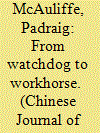

|
|
|
|
|
| Publication |
2014.
|
| Summary/Abstract |
Though it was initially presumed that the primary role of the International Criminal Court (ICC) would be a residual one of monitoring and ensuring the fulfilment by the State of its obligations under the Rome Statute, it has over time moved towards a more activist "burden-sharing" role. Here, the Office of the Prosecutor initiates prosecutions of the leaders who bear the most responsibility for the most egregious crimes and encourages national prosecutions for the lower-ranking perpetrators. Since at least 2006, the Prosecutor has committed to a formal policy of inviting and welcoming voluntary referrals as a first step in triggering the jurisdiction of the Court. The judges on the Court have approved these referrals, while the broader academic and activist communities welcomed this more vertical relationship with national jurisdictions and, significantly, have provided the intellectual justifications for it. Burden-sharing, a concept unmentioned at the Rome Conference establishing the ICC, is presented as an unproblematic, natural and organic emanation from the Statute. This article argues that this development was not in fact inevitable or mandated by the Rome Statute. It was chosen, and in justifying this choice, familiar modes of cosmopolitan-constitutionalist treaty interpretation fundamentally premised on the field's virtue and indispensability have operated to enable a Court established as a residual watchdog to become a workhorse in individual situations by assuming the preponderance of responsibility for combating impunity.
|
|
|
|
|
|
|
|
|
|
|
|
|
|
|
|
| 6 |
ID:
133976
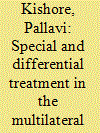

|
|
|
|
|
| Publication |
2014.
|
| Summary/Abstract |
Special and differential treatment (S&DT) provisions relate to developing and least developed members of the World Trade Organization (WTO). The effectiveness of S&DT provisions is important because they (1) address asymmetries between members and (2) give the WTO a global character, i.e. it is perceived as catering to the interests of all its members. Have these provisions been effective? Not really. This is mainly because these provisions are non-binding, ambiguous, unstructured and lack connectivity with each other. Developing countries claim they are best endeavour clauses and unrealistic. So how can these provisions be made effective? This article examines the concept of S&DT including its history, reasons behind its introduction and continuation, its merits and demerits, reasons for its success and failure, its jurisprudence, and provides suggestions for improvement.
|
|
|
|
|
|
|
|
|
|
|
|
|
|
|
|
| 7 |
ID:
133974


|
|
|
|
|
| Publication |
2014.
|
| Summary/Abstract |
This article explores the conceptual relationship between trafficking in human beings, enslavement and crimes against humanity. The analysis of case law of the International Criminal Tribunal for the Former Yugoslavia and the European Court on Human Rights reveals that, while trafficking in human beings and enslavement are increasingly overlapping, they still do not coincide. Moreover, enslavement is only a crime against humanity if it is committed in a widespread or systematic manner by an organization which displays State-like features. In the opinion of the author, the qualification of human trafficking as "modern slavery" is therefore confusing. The fact that human trafficking covers a wide array of offences influences the choice of forum in respect of criminal law enforcement. While enslavement as a crime against humanity may belong to the jurisdictional realm of international criminal tribunals and the International Criminal Court (provided that domestic jurisdictions have proved to be "unwilling" or "unable"), other forms of human trafficking are, in the view of the author, best left to national courts.
|
|
|
|
|
|
|
|
|
|
|
|
|
|
|
|
| 8 |
ID:
133971
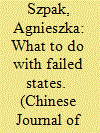

|
|
|
|
|
| Publication |
2014.
|
| Summary/Abstract |
The phenomenon of so-called failed States poses many challenges for the international community and international law as such. Are such States still international subjects or do they lose their legal personalities? How may respect for the human rights of people living in such States be ensured? What can be done about this failed States problem? Here I will first present the notion of failed States and their characteristic features and then add a few words on the Failed States Index which is the most common instrument used when delving into the failed States issue. The last section will concentrate on the solution to State failure, with special emphasis on a bottom-up approach. In my opinion this solution is highly preferable compared to the others suggested
|
|
|
|
|
|
|
|
|
|
|
|
|
|
|
|
|
|
|
|
|